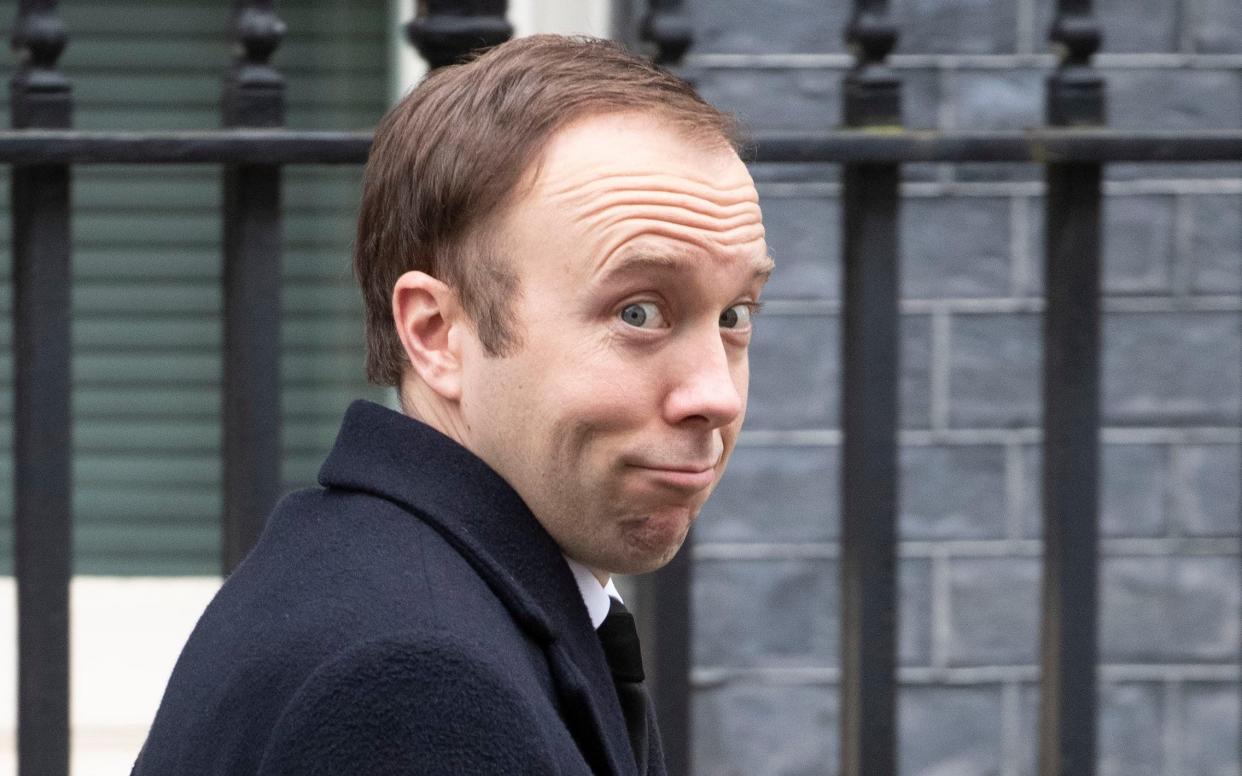Letters: Locked-down citizens deserved better than Hancock’s political games

- Oops!Something went wrong.Please try again later.
- Oops!Something went wrong.Please try again later.
SIR – A society can be judged by the manner in which it treats its most vulnerable citizens.
You report (March 7) that Matt Hancock discussed blocking funding for a new disabled children’s centre in Bury if the town’s MP opposed fresh lockdown restrictions. This suggests that he regarded the potential users of such a centre as currency for achieving his political goals.
Surely no amount of spin can save Mr Hancock now.
Sarah Sharp-Smith
Leominster, Herefordshire
SIR – Your Lockdown Files show that a small number of Conservative MPs were courageous in challenging Matt Hancock’s policies; that they were threatened for doing so is disgraceful.
But where was the Opposition?
Jonathan Mann
Gunnislake, Cornwall
SIR – On March 16 2020, I wrote to you saying: “The suggestion that 10 million pensioners will co-operate with virtual house arrest for weeks on end is frankly laughable. Those that are seriously suggesting it are living in cloud cuckoo land.” How wrong I was.
The most frightening aspect of the whole Covid affair was the extent to which British people bought into the Government’s messaging and were only too happy to co-operate.
The fact that, far from “following the science”, people like Matt Hancock were actually ignoring advice in a vain attempt to burnish their own careers only makes it worse. It also underlines the great danger we would face if a truly malign authoritarian regime were to achieve power.
Brian Gedalla
London N3
SIR – Nowadays the world is full of armchair experts on Covid, but in early 2020 we had little understanding of this virus.
We had seen the chaos in Wuhan and northern Italy, and most of us were very concerned about the NHS getting swamped to the extent that it would have to turn away very sick people, who would die as a result. I was a retired doctor by then, but in contact with many who were still practising, including those who staffed the intensive care units.
At that stage, we knew so little about the virus that doctors didn’t even understand the nature of the lung complications that were killing people, and it took a short while to realise they needed to modify their treatment. The vast majority of them thought that a form of lockdown was essential, and were highly critical of Boris Johnson for not doing it earlier. Indeed, much of the public was similarly critical. Personally, I was just grateful that I wasn’t having to make the difficult decisions.
Three years on, those baying for blood need to pause and think. Next time we have a pandemic featuring a novel virus, what should we do differently? We need an objective analysis; mudslinging will only make politicians prioritise the optics to an even greater extent.
Dr Jenny Jessop
Doncaster, South Yorkshire
Immigration reform
SIR – The influx of illegal migrants, which Suella Braverman, the Home Secretary, promises to stop (report, March 7), has compounded more than two decades of unprecedented levels of legal immigration, with no electoral mandate and no comparable provision of housing and infrastructure. At the heart of this policy is the apparent belief that the size of Britain’s population is immaterial.
Asylum laws date from the end of the Second World War, when international – let alone intercontinental – travel was comparatively rare. In an increasingly unstable world, with problems exacerbated by exploding populations, climate change and warfare, they require revision.
Chris Jones
Croydon, Surrey
SIR – As a former director (ports) of the then Immigration Service, I am pessimistic about the Government’s plan to deter and prevent asylum seekers from crossing the Channel in small boats.
Even if it gains sufficient support for the changes to become law, there will inevitably be legal challenges involving both domestic and international law. Secondly, there are questions over the practicality of holding securely and then deporting large numbers of arrivals, given the very limited size of detention facilities.
There is also the question of where to deport them to. It is hoped that the numbers of arrivals will decrease, but where are the “safe countries” that will accept deportees? Rwanda is quoted, but my understanding is that it has few holding facilities and will charge large sums for each deportee.
The problem could be stopped virtually overnight if France accepted the return of migrants, which would break the traffickers’ business model. The French say they wish to rid the Pas-de-Calais area of migrant camps and to stop the traffic. The UK has contributed tens of millions of pounds to assist – but to little effect. Pressure must be applied to persuade the French to intercept the boats in their waters, rather than shadowing them until they reach British waters. Furthermore, rather than releasing those who are intercepted – only for them to try again – deterrent action must be taken against them.
More widely, the UK should call on the EU to beef up arrangements for the prevention of asylum seekers entering the Schengen Area illegally. And while the current focus is on the small boats problem, the even bigger problem of failed asylum seekers and “overstayers” who are not being removed from Britain must also be addressed.
Peter Higgins
West Wickham, Kent
Political civil servants
SIR – Charles Moore (Comment, March 4) writes that no civil servant of Sue Gray’s seniority has ever moved into politics.
However, in 1942 Sir James Grigg, then permanent under-secretary of state at the War Office, was appointed by Winston Churchill as the secretary of state for war. He was later elected as the MP for Cardiff East.
C D C Armstrong
Belfast
Breakfast relic
SIR – Margaret Clark’s letter (February 27), asking how to describe a propelling pencil, reminded me of a recent visit to a charity shop to look for a toast rack. I was told that they did not sell electrical equipment.
Janet Whitewright
Congleton, Cheshire
The litter pickers
SIR – I am one of a dedicated band of volunteer litter pickers (Letters, March 7) who strive to keep the hedgerows and verges around their towns and villages clear of litter.
It is a never-ending task, and our group can only do it with the help and support of our parish council, and the occasional visit from the county council “men in orange”, who will dispose of our full bags when we have collected enough to make it worth their while.
The problem is that it is not safe or practical for volunteers to work on the main roads and motorway verges that so desperately need attention. This requires signage, cones and insurance for a proper job to be done. I am sure that county councils will say that there is no money for such an undertaking. In other developed countries, certainly in Europe, litter doesn’t appear to be the problem that it is here.
The “Great British Litter Pick” will be taking place between March 17 and April 2, and I am sure that hundreds of enthusiastic litter pickers across the country will be collecting an enormous amount of litter. It is just a pity that we are unable to attack the parts of the country that really need our attention.
Lorna Cubbage
Northall, Bedfordshire
DVLA hounding
SIR – A letter dated February 28 2022 from the DVLA was delivered to our house recently. In bold red capitals, it says: “You must renew your expired driving licence now or risk not being able to drive.” It continues: “Our records show that your driving licence, which must be renewed every 10 years by law, has expired.”
The addressee is our daughter. She died on March 2, 16 years ago, aged 31. I registered the death in the normal way at the time and had correspondence with government departments, including HMRC and the Probate Office.
Why is a letter being sent to her 16 years after her death? Why was a letter not sent 10 years after the expiry date of the licence? Why is the letter dated 2022? Who is managing the DVLA?
Brian D Hamilton
Ponteland, Northumberland
Fuss-free tomatoes
SIR – I have an easier process for growing tomatoes (Letters, March 4). I put a slice of tomato on the garden soil. Result: healthy plants, with no cost involved. Just patience needed.
Joan Parkinson
Clayton-le-Moors, Lancashire
The key to ensuring a fair game of Poohsticks

SIR – In response to your Leading Article (“A bridge too far?”, February 27), I feel I should point out that Poohsticks are never “flung”, as this would put the flinger who flung the furthest at a disadvantage when the sticks emerged behind them from under the bridge.
Poohsticks are always dropped straight down and at the same time.
Martin Flint
Saxlingham Nethergate, Norfolk
How medical education was dumbed down
SIR – Professor Irving Taylor (Letters, March 6) argues in favour of more medical student apprenticeships.
When I entered medical school 50 years ago, we spent two years learning the basic sciences. We were then attached to one of two consultants for several months at a time, on “firms”. This involved clerking patients, taking bloods, performing minor tests and, on surgical firms, assisting in theatre.
At the time of my retirement, it was very rare to see a medical student on a ward. Playing with dummies is no match for dealing with real people.
Having qualified, we were assigned house jobs – in my case with one surgeon for six months. A further 11 years of training followed. These were genuine apprenticeships. Now, thanks to academic educationalists and the European Working Time Directive, juniors are under-trained at the time they are meant to take up consultant posts. Sadly, responsibility for the dumbing-down of medical education lies with me and my peers – for allowing it to happen.
David Nunn FRCS
West Malling, Kent
SIR – Professor Irving Taylor suggests that medical students should be employed in the health service while at university.
This may not be a regular practice for medical students but it certainly used to be for radiographers. I trained at a school of radiography based at Dudley Road Hospital in Birmingham – three days a week in the classroom and two in the department learning under the guidance of senior radiographers.
I dealt directly with patients throughout my three-year training and gained valuable clinical experience. When I qualified, I was capable of working independently immediately and felt confident in my job.
I noticed that, when radiography became a degree course, newly qualified radiographers had very little practical experience, couldn’t be left alone to work and seemed to think they were there to network with doctors and sit tapping at a computer, rather than actually getting on their feet and dealing with patients.
Karen Gwynn
Bromsgrove, Worcestershire
Letters to the Editor
We accept letters by post, fax and email only. Please include name, address, work and home telephone numbers.
ADDRESS: 111 Buckingham Palace Road, London, SW1W 0DT
FAX: 020 7931 2878
EMAIL: dtletters@telegraph.co.uk
FOLLOW: Telegraph Letters on Twitter @LettersDesk

